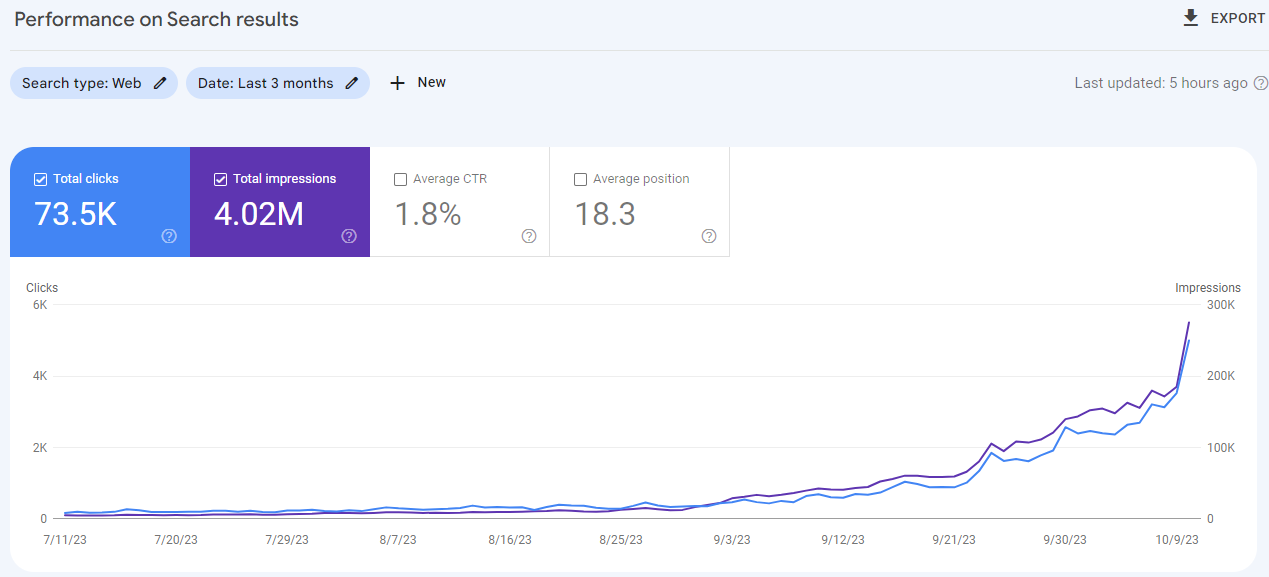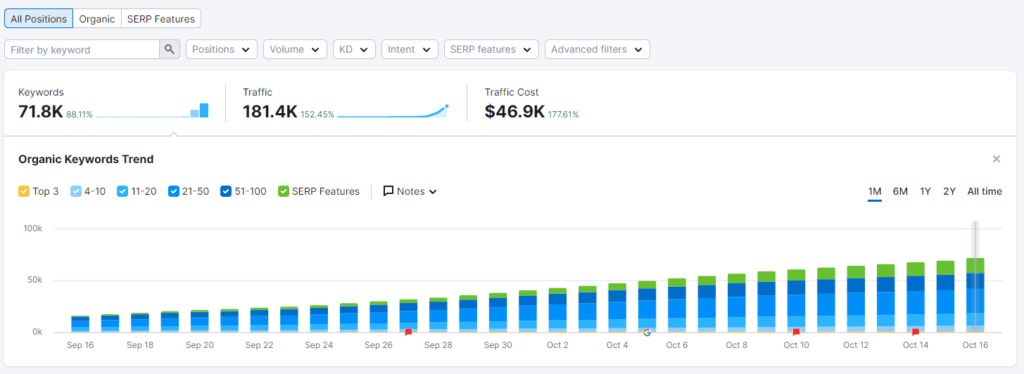Don’t Waste Money On Empty Promises
The search engine optimization agency focused on growing your business,
...not your marketing budget.
We empower your online success through proven SEO and demand generation strategies.
An SEO Marketing Company That Understands Your Needs
Let’s be honest. You have a clear vision of what you want, but you’re not quite sure how to achieve it.
SEO is an area of marketing that can grow out of control!
Chances are, you’re looking to tame one of the following SEO beasts:
• Your website is struggling to gain online visibility.
• Your website traffic has taken a recent hit, and you’re not sure why.
• You’ve noticed a sudden drop in incoming calls and leads.
• You’re launching a new website and need a quick boost in business.
If any of these scenarios sound familiar, you can rest assured that you’ve found the right SEO partner. Prorevgro offers SEO optimization solutions that adapt to Google’s ever-evolving algorithm.

Losing Control of Your Marketing? We Can Help!

Data-Driven Search Engine Optimization
When done right, Search Engine Optimization (SEO) is a powerful magnet for attracting new customers and qualified leads to your website.

Crafting Precision SEO Strategies for Success
Our SEO specialists dive into your business, analyzing your website and target audience. We sculpt a strategy from hard data to snag you the best results.

Resilient SEO Principles for Proven Results
We don’t gamble with your SEO. Our strategies are carved from rigorous research and science-backed data, delivering proven results every time.

Fuel Growth With Our Expert SEO Services
Reach out today to discover how our monthly SEO services are your blueprint to skyrocketing revenue.

Are you currently ranking on the first page of search engine results (SERPS) for keywords relevant to your business or brand?
If not, you’re overlooking a valuable source of potential leads.
Search engine optimization is no longer optional.
It’s a crucial component that can’t be ignored if you’re looking to expand your business.
It’s an essential element of any strategy to market products or services effectively, attracting qualified leads and driving sales.
Search Analysis
Keyword Stuffing is so...2010.
Old spammy tactics like keyword stuffing have (thankfully) faded into oblivion. Today, successful SEO relies on meticulous research, user intent understanding, and high-quality, relevant content. This approach not only boosts search engine rankings but also builds trust and credibility with the audience.
- SEO needs to evolve with Google E-E-A-T principles
- Meticulous research and quality content drive success
- Our SEO establishes topical authority and builds trust...fast!
$300M+
B2B Enterprise Client Revenue Generated
Page 1
"fast website design"
"affordable web design"
"baltimore local seo"
"seo audit pittsburgh"
"norfolk seo experts"
"accountant seo company"
"seo audit san diego"

SEO has evolved since the days when Earl reigned as the "King of Keywords"
Effective search analysis is critical in SEO. Choosing the wrong keyword strategy can result in irrelevant search visibility or none at all.
However, with the right research, you can dominate even the toughest competition and propel your business forward.
We leverage bold innovation like AI and Automation, but our SEO strategy is always based on Google approved methodology.
We don’t try to “hack” Google.
We give them what they like.

The Proof is in the Results
Where Does Your SEO Agency Rank?
SEO agencies need to showcase their own website’s SEO results to build trust, demonstrate expertise, and establish credibility.
If they can’t rank their own website, how will they rank yours?
SEO Strategies That Dominate
Thinking Beyond Ordinary Strategies.
With over 17 years of hands-on experience and a foundation in scientifically proven data, our SEO strategies guarantee real results and the highest ROI possible.
Claim your free competitor strategy review today to experience firsthand how Prorevgro can help you rapidly dominate your market.

- Actual client results - 71.8k keywords - Delivering $46.9k value every month.

SEO Audit
We Start Here: Comprehensive SEO Analysis
We cover a wide range of critical SEO aspects and provide a holistic view of your website’s performance and opportunities for improvement.
Site Health Audit
Identify technical issues, crawlability, and indexability problems.
Keyword Rankings
Monitor your website's ranking for specific keywords and track changes.
Competitor Analysis
Compare your performance to competitors and uncover opportunities.
On-Page SEO
Audit individual pages for meta tags, content quality, and keyword optimization.
Content Audit
Evaluate the performance of your content marketing efforts with engagement metrics.
Backlink Profile
Analyze the quality and diversity of your backlinks, including identifying toxic links.
Monthly SEO Package Pricing
Start Growing
SEO Package #1- Publish 250 Pages/Month
- Publish 1 Article/Month
- Establish Topical Authority
- Rank for Keywords
- Google E-E-A-T Ready
Steady Growth
SEO Package #2- Publish 1000 Pages/Month
- Publish 4 Articles/Month
- Grow Topical Authority
- Rank Dozens of Keywords
- Address Google E-E-A-T
Rapid Growth
SEO Package #3- Publish 2000 Pages/Month
- Publish 6 Articles/Month
- Rapid Topical Authority
- Rank 100s of Keywords
- Optimize Google E-E-A-T
Maximize Growth
SEO Package #4- Publish 5000 Pages/Month
- Publish 10 Articles/Month
- Own Topical Authority
- Rank 1000s of Keywords
- Master Google E-E-A-T

Finding the Best SEO Company For You
We Strive To Earn Your Business
How can you be sure you’ll achieve the best results?
In an industry where many SEO companies make grand promises without substantial evidence, we stand out by delivering measurable and guaranteed results for our clients.
Our confidence in the value we provide is so strong that we don’t require long-term contracts. Cancel anytime, for any reason.
What Drives Us
Our Passion is Growing Your Online Business
We drive demand generation with SEO-optimized organic content creation and distribution that attracts massive traffic to your website.
But it all starts with knowing your ideal customers and providing content that they find useful.
1
STEP 1
Customer Analysis
Who are the stakeholders, the end users and the decision makers?
2
SECOND STEP
Know Their Needs
Understand the problems they’re trying to solve and how they search for answers.
3
THIRD STEP
Scope Competition
Find out how the competition is finding customers and exploit the gaps.
4
FOURTH STEP
Plan Content
SEO search analysis that brings it all together. Plan the content to publish.
Years Experience with SEO
Keywords Ranked
Avg Monthly Increase
90-day Growth Rate
Keyword
Frequently Asked Questions (FAQs) About SEO Marketing
Our SEO Company Brings a Deep Focus on ALL Things SEO
How Long Does It Take to See Results from SEO?
SEO is typically a mid to long-term strategy. Early results can be seen within a few weeks. Maximum results may take 3-9 months depending on the competition, industry, and the specific strategies employed.
How Do Google's Search Engine Algorithms Affect SEO?
Google continually updates their algorithms, affecting how websites are ranked. SEO professionals must stay up to date with these changes to ensure continued visibility and effectiveness.
What Are Long-Tail Keywords in SEO?
Long-tail keywords are longer, more specific keyword phrases that often have lower search volume but can target users more precisely, often leading to higher conversion rates.
What is the Difference Between "White Hat" and "Black Hat" SEO?
White Hat SEO refers to ethical practices that align with search engine guidelines, while Black Hat SEO involves tactics that attempt to manipulate or trick search engines. Black Hat practices can lead to penalties or even being de-indexed from search results.
How Does User Behavior Affect SEO?
User behavior, such as time spent on a page, bounce rate, and click-through rate, can influence search engine rankings as they provide insights into the relevance and quality of the content to the user’s query.
Can Small Businesses Benefit from SEO?
Small businesses can greatly benefit from SEO by improving online visibility, attracting targeted traffic, and competing effectively with larger businesses in search engine results.
How Can I Measure the ROI of My SEO Efforts?
Measuring SEO ROI involves tracking key performance indicators (KPIs) like organic traffic, conversion rates, customer acquisition costs, and comparing them against the investment in SEO activities. Tools like Google Analytics can aid in this analysis.
How Does Structured Data Impact SEO?
Structured data helps search engines understand the content on a page more effectively. By using schema markup, you can provide specific details about your content, which can lead to enhanced search results and potentially better rankings.
FREE CONSULTATION
Unlock a world of actionable insights, expert advice, and cutting-edge strategies to propel your marketing efforts and accelerate your business growth.
